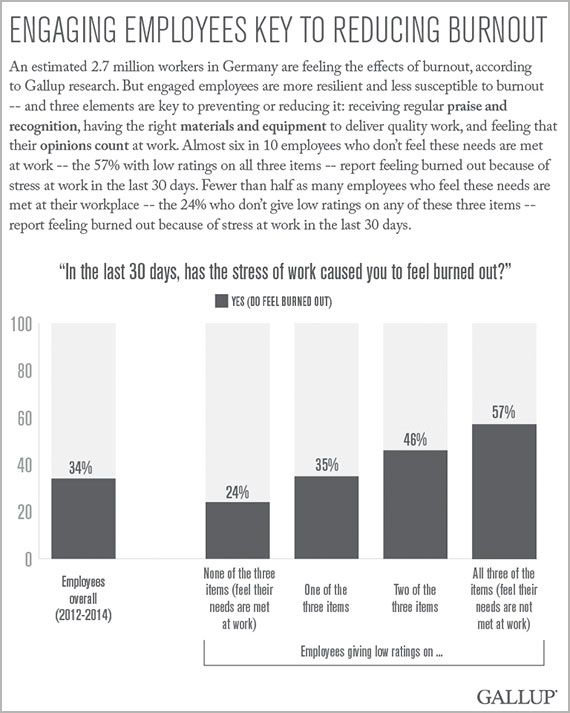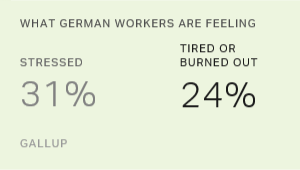Story Highlights
- An estimated 2.7 million German workers are feeling burned out
- Employees want recognition and their opinions to be heard
- Managers are the key to preventing employee burnout
Many German employees are feeling burned out, and the problem is costly to the European Union's largest economy.
In 2012, the German business publication Manager Magazin reported the number of burnout cases among companies in the DAX, the German stock index covering the 30 most actively traded blue chip companies on the Frankfurt Stock Exchange. Working with patient data, the European hospital chain Asklepios estimated that, on average, 1,500 to 3,300 workers at each of the 30 DAX companies are treated for the effects of burnout annually. And in 2013, the former German Labor Minister, Ursula von der Leyen, reported that psychological illnesses caused by workplace stress resulted in 59 million lost days of work in 2011, costing the country's economy an estimated 6 billion euros.
In response to the growing concern about worker burnout, Gallup conducted a statistical analysis to identify the strongest means of mitigating burnout through employee engagement, using data collected between 2012 and 2014 from a representative sample of more than 4,000 employees in Germany. Gallup measured engagement using its Q12 employee engagement survey. Workers were also asked questions about workplace stress and burnout and about absences as a result of illness.
The analysis revealed that three engagement elements are vital to reducing or repairing workplace burnout among workers: receiving regular praise and recognition for good work, having the materials and equipment to deliver quality work, and feeling that their opinions count at work. Workers who gave low ratings to these three items -- 8% of all workers in Germany, or an estimated 2.7 million employees -- were more likely than workers who gave high ratings to all three to say they felt burned out because of stress in the last 30 days.
Workplace stress affects both companies and workers' personal lives. German employees who gave low ratings on the three key elements were absent as a result of illness 11 days in the past year, compared with six days in the same time frame for employees who gave high ratings to the items. Furthermore, 33% of employees who rated all three elements low reported that stress at work had caused them to behave poorly with their family and friends on three or more days in the last 30 days, compared with 11% who rated all three items high and mentioned the same behavior.

Managers Are Crucial to Mitigating Workplace Burnout
Gallup has been continuously measuring and reporting on German workplace engagement since 2001. This research has shown that in any given year, fewer than one-fifth of employees in Germany report being engaged in their jobs. Our most recent research shows that in 2014, only 15% of employees were engaged, while 15% were actively disengaged.
Employee engagement is primarily driven by how supervisors at all levels manage their employees. Given the current state of employee engagement in Germany, it's evident that most managers aren't creating environments in which employees feel motivated, which is contributing to employee burnout.
What can German companies do to alleviate burnout and foster healthier and more productive workplaces? Managers must:
- Help employees feel that they are contributing to the company and that their contributions are valued. Workers often only hear from their bosses when problems occur, which makes them feel as if their company takes their good work for granted. Honest feedback is essential to an accurate assessment of performance. But more importantly, prompt, specific feedback provides the information employees need to learn and eventually master new tasks and demands. For feedback to be the most effective, managers' comments should relate directly to an employee's actions or behaviors, and managers should give feedback immediately, or as close to the action as possible.
- Provide frequent and immediate recognition for good work. Recognition creates beneficial positive emotions that broaden employees' perspectives and stimulate creative thinking about how employees can do more. Recognition is a powerful motivator that costs nothing. But Gallup has found significant individual differences in how employees prefer to receive recognition. To frequently provide objective, sincere recognition, managers must constantly make an effort to understand the type of recognition every worker wants, such as public or private, written or verbal.
- Give employees what they need to do their work right. When employees have what they need to do their work accurately, it maximizes efficiency, prevents frustration and demonstrates that the company values their work and supports them. Companies operate most effectively when workers have the right equipment, tools, materials and information; have clear responsibilities; have appropriate resources, such as staffing or budget; have their manager's support; and aren't limited by bureaucracy or distracted by unnecessary activities.
- Listen to employees and include them in problem-solving. Workers want to be involved and to help shape things affecting their workplace and work -- and no one wants to be ignored. Two-thirds of employees who agreed or strongly agreed that their opinion counts at work also felt their current job brings out their most creative ideas, according to a 2010 Gallup study. However, among those who disagreed or strongly disagreed, only 10% felt their current job brings out their most creative ideas. Gallup research in Germany from 2012 underscores this point: 61% of employees who agreed or strongly agreed that their opinion counts at work had an idea for improving their company in the last 12 months, compared with 40% of workers who disagreed or strongly disagreed that their opinion counts at work and had an idea. About half of the employees (51%) who agreed or strongly agreed that their opinion counts at work reported that their idea was implemented, compared with only 22% of workers who disagreed or strongly disagreed that their opinion counts at work and reported an idea implemented. When employees feel that their opinions and ideas are unwelcome or ignored, they lose interest and stop participating. When this happens, teams miss opportunities to improve on their ideas, uncover problems and innovate. Employees are often much closer to factors that affect team performance than their managers, so getting employees' input can lead to better decision-making.
- Create a trusting environment that encourages open discussion. Great managers treat employees' ideas and opinions with respect, and they don't "shoot the messenger." Managers should encourage workers to freely express their opinions, both positive and negative. Once an employee shares his or her idea or opinion, great managers follow through by telling the contributor the outcome -- favorable or unfavorable. And if the outcome is unfavorable, great managers always explain why. Negative responses to ideas are always better than no feedback at all.
This is the clear message to leaders: Set up managers to succeed. They are the key to creating a working environment that prevents people from burning out. Managers can directly influence their company's performance and workers' lives by engaging employees.
Leaders must hold managers accountable for giving employees recognition for work well done, providing the materials employees need to do their work right and ensuring that employees' opinions are heard and respected. Gallup's analysis suggests that managers' positive actions -- and the day-to-day work environment they create -- are crucial in preventing burnout among employees.
Survey Methods
Results are based on telephone interviews conducted Aug. 1-Dec. 21, 2012; Nov. 4-25, 2013; and Nov. 4-Dec. 3, 2014, with a random sample of 4,189 employed adults. All respondents were living in Germany and selected using random-digit-dial sampling. Interviews are conducted with respondents on landline and cellular phones. Samples are weighted by gender, age, education, region, profession (job type and role), employment status (full time and part time), and adults in the household. Demographic weighting targets are based on the most recently published data from the German Statistics Office.

